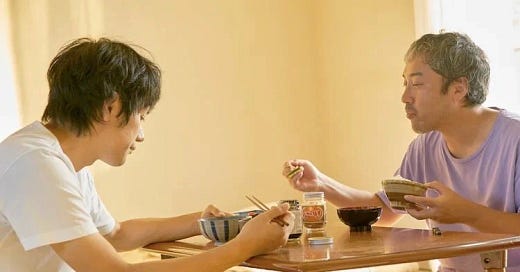VIFF Review: "Riverside Mukolitta"
Naoko Ogigami's charming tale of death and community just had its North American premiere at Vancouver International Film Festival.
Riverside Mukolitta (2022, Dir. Naoko Ogigami)
Last week, I went to Vancouver International Film Festival, and saw a number of excellent movies. My favorite was Riverside Mukolitta, which had its North American premiere at the festival. You won’t be able to find it on streaming services for a while, so until then, be sure to check out this review!
Just after Takeshi Yamada (Kenichi Matsuyama) moves into the tiny Mukolitta apartments, his next-door neighbor, Kozo Shimada (Tsuyoshi Muro) tries to break in. Kozo shows up at Takeshi’s front door explaining that his bath is broken, and has been stinking like a pig for weeks. When Takeshi expresses some hesitation, Kozo turns desperate: he ignores any pretenses of consent and steps straight into Takeshi’s apartment. Takeshi, freaked out, slams the door in his face. Kozo tries again the next day, this time with the gift of vegetables from his garden—a gift intended purely as a ruse, a distraction that allows him to sidestep into Takeshi’s home, as he half-talks, half-forces his way into his neighbor’s bathtub.
In any other film, such an act would be seen as invasive, but in Riverside Mukolitta, Naoko Ogigami’s charming new film, it is instead a gesture of kindness. For Takeshi, a recently released and depressed ex-con, Kozo’s intrusions are necessary. Takeshi has just moved into the Mukolitta apartments, and without friends or family to call his own, he has very little to live for—a fact made morbidly clear in the film’s early scenes, when he receives a phone call from the morgue informing him that his estranged father has recently passed away. Out of some latent sense of familial obligation, Takeshi travels to pick up the remains of a man he never knew. He places them on a shelf in his apartment, solidifying his life as one of quiet moribundity.
So, when Kozo comes barging in to eat his food and use his tub, Takeshi finds himself forced out of his isolated stupor.
Adapted from Ogigami’s own novel, Riverside Mukolitta is a loving tale of communal redemption set at the crossroads between life and death. Taking place almost entirely within the confines of the Mukolitta apartments, the film focuses on a community of oddballs, each of whom have been touched in some way by the specter of death. Whether it be landlady Mimami (Hikari Mitsushima), who is unable to accept the loss of her husband; local monk Gan-chan (Daisuke Kuroda), who cannot for the life of him find funerals at which he can perform religious rites; or the salesmen duo of Kenichi Mizoguchi (Hidetaka Yoshioka) and his son Yoichi, who struggle to find customers for their door-to-door gravestone business—each of them finds the face of demise haunting their lives in some way.
Of them all, Takeshi is the least capable of dealing with death. While the others possess some understanding of funereal traditions, Takeshi questions whether he even owes his father anything at all. After all, i't’s not like he knew the guy. But Kozo—the film’s beating heart—reminds Takeshi of his social responsibilities: “Whatever he was, you can’t pretend he didn’t exist.” This is the message upon which Riverside Mukolitta hinges, and which it delivers with a touching tenderness. We all belong to a system beyond ourselves, and owe it our respect.
With scenes that flow pleasantly and evenly between each other, Riverside Mukolitta finds its greatest poignancy in moments that celebrate the power of social unity, usually through the medium of a good meal. Takeshi’s gratitude at a freshly-cooked bowl of rice, Kozo’s calm work in his abundant vegetable garden, and the delectable smell of an expensive dinner cooked between father and son stand out in the film’s many instances of quiet quotidian joy, sparked by the power of a collective food.
Riverside Mukolitta is defined by miniature moments that revel in the power of chance happenings and unintended friendships, and is directed with Ogigami’s perceptive eye for interpersonal relationships. Just as its characters investigate the line between life and death, the film itself straddles a tightrope between humor and profundity, between individuals and the community to which they belong. “If you find these little moments of joy, you’ll have the strength to endure,” says Kozo in an instance of serendipitous wisdom. Riverside Mukolitta, a joyous experience in itself, celebrates these moments with a peaceful, life-affirming passion.



